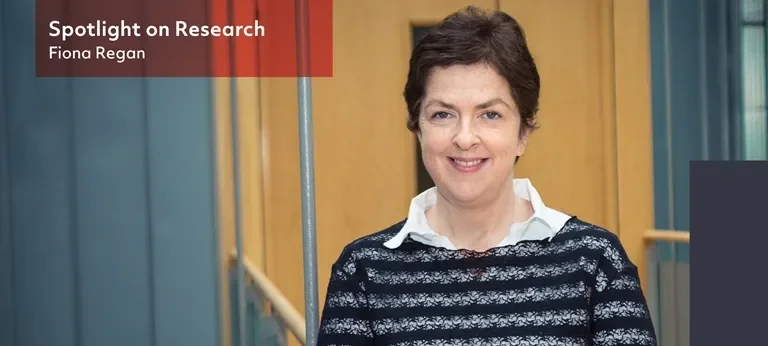

On a mission to make water cleaner and safer
Professor Fiona Regan, Professor in Chemistry and Director of the DCU Water Institute chats to Spotlight on Research
You head up the DCU Water Institute – why the focus on water?
“Water is essential for life, for health, for human society, for industry. It’s so important that we figure out ways to conserve, monitor and protect water and to make sure that when we use water, we use it efficiently.
We set up the Water Institute in DCU to bring together researchers under this common theme, and since it started in November 2015 we have been really successful at bringing in funding and working on new projects, as well as creating more public awareness around the value of water.”
Tell us about some of the research in your lab at the moment.
“Two new researchers started in my lab in October. Joyce O’Grady is working as part of a collaborative project in the Burrishoole catchment in Co. Mayo, where we use technology to monitor the environment.
She is examining ‘environmental DNA’, which is DNA that gets sloughed off from living beings and it leaves a signature in the water.
We want to use it to track the different salmon species that are at the site and see where they travel. We are working on that project with Prof Anne Parle-McDermott and Molly Williams in DCU, it’s very exciting.
Then Chloe Richards has just started a Masters project in my lab to develop new coatings to stop objects in water such as ships, sensors and buoys being fouled, or covered in biofilm.”
How do you stop that kind of fouling, or growth, of surfaces in water?
“It’s a big challenge, particularly when you think about how this fouling can affect objects like ships – the layer or crust on their hulls creates more drag in the water and so they use more fuel, and they need time in dry dock to clean the living material off them.
In my lab, we look at ways to develop materials so fouling organisms can’t stick to them easily in water.
Chloe’s new project is examining fish scales – fish live in water and keep clean, so maybe we can learn something from them! – and we also look at how other animals like crabs stop this process of fouling too.
My lab works with companies on their specific challenges in this area, and we have recently carried out some research with the Fraunhofer Institute in Germany on how to manufacture anti-fouling materials so they can be easily applied to protect surfaces that go into water.”
As well as research, you are keen to increase public awareness about water. How have you been doing that?
“At the DCU Water Institute we have run campaigns on social media, posting facts about water usage and conservation.
I think in Ireland it rains so much that we take water for granted, but we need to think more about how much it costs to treat the water so we can use it in our houses and in industry, and how important it is not to waste it. There are simple things you can do.”
Such as?
“For example, switch off the tap when brushing your teeth, and be more aware of plastics and other chemicals in products you use that can end up polluting oceans and other waterways.
Also, if you have a garden, collect rainwater and use it to water the plants rather than using the treated water from the mains.
Overall, it’s about a mindset of being more aware of water, and understanding that we need to be better stewards of this resource for the planet.”
What do you see as the most exciting developments in the DCU Water Institute since it started?
“As well as the exciting research we do, what has really come through is the growth of leadership among the researchers, and we now have representatives in every faculty in DCU, including colleagues in geography and ecology.
The fact that our researchers have such diverse backgrounds brings a huge amount of enthusiasm, individual researchers find this common theme where their expertise and perspective can make a big difference to a project.”
And what do you like do when you are not actively researching or growing the DCU Water Institute?
“I love music, I listen to all types, and recently I have begun to learn the accordion. It’s a totally new skill for me, and I can feel my brain changing as I learn it.
My husband and young girls love music too, so we have started to play music together, which is great fun.”
